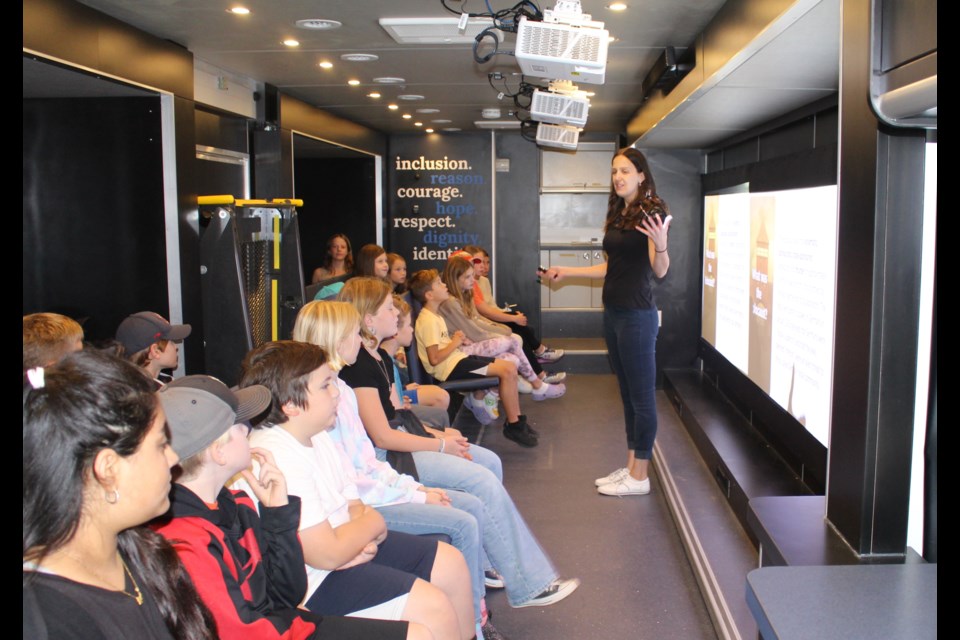Grade 6 students at Forest Hill Public School had a chance to take part in a unique, interactive learning opportunity earlier this week when the Tour for Humanity made a stop at the Midhurst school.
Operated by Friends of Simon Wiesenthal Center (FSWC), the Tour for Humanity is the organization's award-winning mobile human rights education centre and boasts a 30-seat, fully accessible bus that serves as a self-contained classroom.
Inside, the FSWC’s instructors teach students about the horrors of genocide — especially the Holocaust — while addressing issues of racism, intolerance, diversity, democracy, and human rights, explained the organization's website.
The local school hosted the FSWC last year to present programs for various grade levels, and was excited to have them back this year, said principal Megan Francis.
The Tour for Humanity made a stop at Collingwood's St. Mary's Catholic School in February, 2020.
The tour made the Midhurst stop Wednesday afternoon as part of the recently revised social studies curriculum for Grade 6 students, which now includes a focus on learning about the Holocaust to ensure elementary-aged students gain a deeper understanding of the significance and reduce incidents of antisemitism in schools.
“We partnered with them because they are amazing experts who have some really powerful resources they can share. This year, there is a change in the provincial curriculum, so this is an opportunity to build on that partnership with them for us,” she said.
The large coach bus, which includes fold-down, theatre-style seating on one side and large screens on the other, offers students a more hands-on learning experience, she added.
“It’s almost like walking into a miniature movie theatre. There is a presenter there who can provide context and ask questions," Francis told BarrieToday. "It is really interactive for the students, so it’s not just watching a video, reading a textbook or hearing from your teacher. This is interacting with someone who is an expert in this field and can answer lots of questions and guide their thinking.
"You’re also able to look at those visual resources, whether it’s images, text, video clips … which is what makes it powerful."
Samantha Brundage and Asiya Baqi were among the students who had the opportunity to learn aboard the mobile classroom.
“I am excited to learn about the other part of the story. Last year, we learned about one individual and this year we are learning about the entire Holocaust and everything that happened," Brundage said.
"I think it’s good for students to learn about the Holocaust to understand how lucky we are to live in a world where we don’t have to go through the pain they went through being separated from their families and being sent away,” she added.
Getting to meet people last year was great, said Baqi.
“If we do it online, you don’t really remember it. When you do it face-to-face, you will remember it more. We get to learn about more stuff. The Holocaust is something that we should all learn about so we don’t repeat history,” she said.
The powerful part of partnering with the FSWC is that they have experts in the field who can share personal messages and powerful resources with students, noted Francis. For many students, that personal connection truly resonates with them.
Oftentimes, she added, students come away from those types of experiences having had the chance to reflect on what they learned at a deeper level.
“I would say a lot of students don’t know the history — both of the Holocaust and what happened — but also of the factors leading up to that and why that happened. I think it’s really important and an opportunity for us to make that commitment to ensure students understand both the history of Holocaust, but also the legacy of the survivors,” said Francis.
“We’ve noticed the questions they are asking and the thoughts they have about that are really insightful and deeper in their learning when we do these kinds of partnerships," she added.
In addition to the unique learning opportunity, Francis said the mobile classroom provides students the chance to make a more personal connection with someone who has a connection to the Jewish community.
“We all have an obligation to eliminate hate. This is a commitment that as a school we can make towards that, and for students it becomes personal. It’s not something that they can see and walk away from. They have a memory of that person who shared their story … and that’s really powerful," she said.



